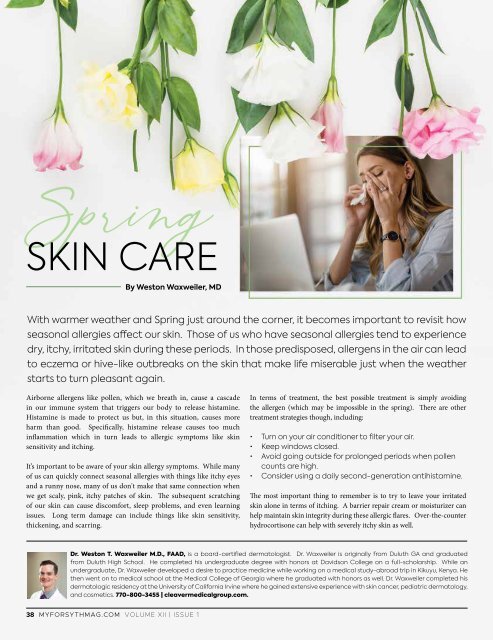My Forsyth _ Spring 2023
Women in Business, Homeownership, Finances, Food, Health & Wellness, and Architecture are just a few of the articles you'll find in the latest issue of your community magazine. Sit back and enjoy. Happy reading!
Women in Business, Homeownership, Finances, Food, Health & Wellness, and Architecture are just a few of the articles you'll find in the latest issue of your community magazine. Sit back and enjoy. Happy reading!
Create successful ePaper yourself
Turn your PDF publications into a flip-book with our unique Google optimized e-Paper software.
<strong>Spring</strong><br />
SKIN CARE<br />
By Weston Waxweiler, MD<br />
With warmer weather and <strong>Spring</strong> just around the corner, it becomes important to revisit how<br />
seasonal allergies affect our skin. Those of us who have seasonal allergies tend to experience<br />
dry, itchy, irritated skin during these periods. In those predisposed, allergens in the air can lead<br />
to eczema or hive-like outbreaks on the skin that make life miserable just when the weather<br />
starts to turn pleasant again.<br />
Airborne allergens like pollen, which we breath in, cause a cascade<br />
in our immune system that triggers our body to release histamine.<br />
Histamine is made to protect us but, in this situation, causes more<br />
harm than good. Specifically, histamine release causes too much<br />
inflammation which in turn leads to allergic symptoms like skin<br />
sensitivity and itching.<br />
It’s important to be aware of your skin allergy symptoms. While many<br />
of us can quickly connect seasonal allergies with things like itchy eyes<br />
and a runny nose, many of us don't make that same connection when<br />
we get scaly, pink, itchy patches of skin. The subsequent scratching<br />
of our skin can cause discomfort, sleep problems, and even learning<br />
issues. Long term damage can include things like skin sensitivity,<br />
thickening, and scarring.<br />
In terms of treatment, the best possible treatment is simply avoiding<br />
the allergen (which may be impossible in the spring). There are other<br />
treatment strategies though, including:<br />
• Turn on your air conditioner to filter your air.<br />
• Keep windows closed.<br />
• Avoid going outside for prolonged periods when pollen<br />
counts are high.<br />
• Consider using a daily second-generation antihistamine.<br />
The most important thing to remember is to try to leave your irritated<br />
skin alone in terms of itching. A barrier repair cream or moisturizer can<br />
help maintain skin integrity during these allergic flares. Over-the-counter<br />
hydrocortisone can help with severely itchy skin as well.<br />
Dr. Weston T. Waxweiler M.D., FAAD, is a board-certified dermatologist. Dr. Waxweiler is originally from Duluth GA and graduated<br />
from Duluth High School. He completed his undergraduate degree with honors at Davidson College on a full-scholarship. While an<br />
undergraduate, Dr. Waxweiler developed a desire to practice medicine while working on a medical study-abroad trip in Kikuyu, Kenya. He<br />
then went on to medical school at the Medical College of Georgia where he graduated with honors as well. Dr. Waxweiler completed his<br />
dermatologic residency at the University of California Irvine where he gained extensive experience with skin cancer, pediatric dermatology,<br />
and cosmetics. 770-800-3455 | cleavermedicalgroup.com.<br />
38 MYFORSYTHMAG.COM SPRING VOLUME <strong>2023</strong> XII | ISSUE 1












